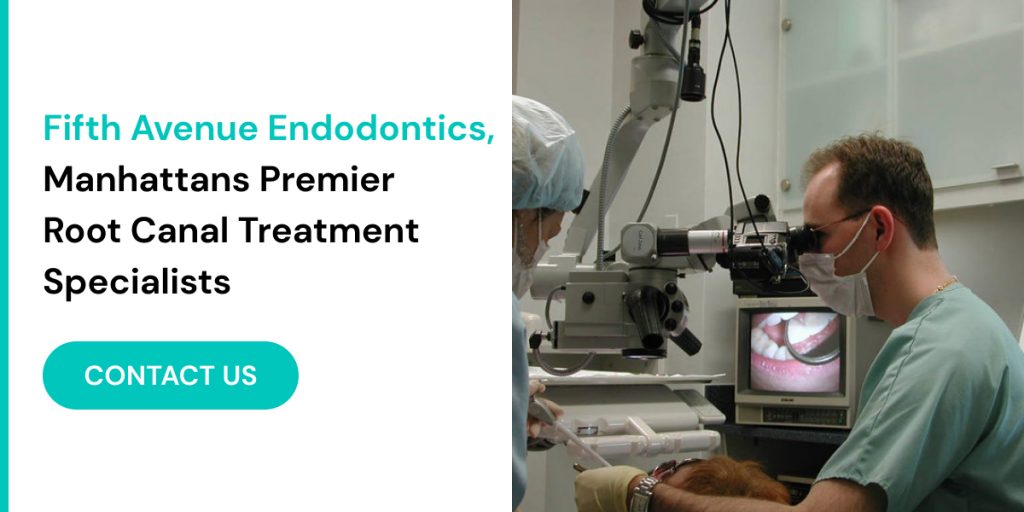Understanding Broken Tooth Treatment in Manhattan, NY
When you find yourself dealing with a broken tooth, the discomfort can be overwhelming, and immediate attention is often required. A broken tooth isn’t just a cosmetic issue; it can lead to significant pain, sensitivity, and even infection if not properly treated. The initial shock of the injury can leave you feeling uncertain about the next steps. In Manhattan, NY, specialized endodontists like Dr. Iofin at Fifth Avenue Endodontics offer expert care for such dental emergencies. These professionals are highly trained in managing and treating dental trauma, ensuring that each patient receives the most effective and appropriate treatment for their condition. This blog post aims to educate you on the critical role endodontists play in treating broken teeth, providing insights into their specialized approach and the advanced techniques they use. By understanding the importance of seeking prompt and professional care, you can make informed decisions that promote better dental health and long-term outcomes. Whether your broken tooth is the result of an accident, decay, or other factors, knowing that you have access to experienced specialists in Manhattan can provide peace of mind and help you get back to normal with minimal disruption.
What Causes Teeth to Break?
Teeth can break for various reasons, and understanding these causes can help you prevent future incidents. Awareness of these causes empowers you to take proactive steps in maintaining your dental health and avoiding the pain and inconvenience of a broken tooth. Here are some common causes:
- Trauma: Physical impact from sports, accidents, or falls can result in broken teeth. Even a minor incident can cause significant damage, especially if the tooth was already compromised. Participating in contact sports without a mouthguard, or experiencing an unexpected fall, can lead to chips, cracks, or complete breaks in teeth. The force from a direct hit to the mouth or jaw can be substantial enough to fracture even the healthiest teeth.
- Decay: Cavities weaken teeth, making them more susceptible to breaking. Tooth decay erodes the enamel and dentin, leaving the tooth structure fragile and prone to fractures under pressure. When decay is not addressed promptly, it can spread and significantly weaken the tooth, making it more vulnerable to breaking even under normal chewing conditions.
- Biting Hard Objects: Chewing on hard foods or objects, such as ice, hard candies, or even non-food items like pens, can crack or break teeth. These habits can put undue stress on your teeth, leading to sudden breaks. While it might seem harmless, biting on hard objects exerts excessive force on the enamel, which can result in fractures, especially in already compromised teeth.
- Wear and Tear: Over time, teeth can wear down and become more prone to breaking. This natural aging process, coupled with habits like teeth grinding (bruxism), can thin the enamel and weaken teeth. Grinding, often done unconsciously during sleep, applies continuous pressure and friction, which wears down the tooth surfaces, making them more susceptible to cracks and breaks.
- Large Fillings: Large dental fillings can weaken the remaining tooth structure. When a significant portion of a tooth has been replaced by a filling, the remaining natural tooth material may not be strong enough to withstand normal biting and chewing forces, leading to breaks. The disparity between the filling material and natural tooth structure can create points of weakness, especially if the filling is old or not properly bonded.
By recognizing these common causes, you can take measures to protect your teeth. Regular dental check-ups, good oral hygiene, and wearing protective gear during sports can all contribute to stronger, healthier teeth and reduce the risk of breakage. Understanding these factors not only helps in preventing dental injuries but also emphasizes the importance of seeking timely dental care to address potential vulnerabilities before they result in more severe damage.
The Initial Response to a Broken Tooth
If you experience a broken tooth, it’s essential to act quickly to prevent further damage and infection. Knowing how to respond immediately can make a significant difference in the outcome. Here are the steps you should take to manage the situation effectively:
- Rinse Your Mouth: Use warm water to clean the area. This helps remove any debris and reduce the risk of infection. Gently swish the water around your mouth, ensuring that the area around the broken tooth is thoroughly rinsed. Avoid using hot or cold water as it might cause additional discomfort, especially if the nerve is exposed.
- Apply a Cold Compress: Reduce swelling and pain with a cold compress on your cheek near the affected area. Apply the compress intermittently for 10-15 minutes at a time. This not only helps in numbing the area, reducing pain, but also minimizes swelling, which can prevent further complications. Be sure to wrap the cold compress in a cloth to avoid direct contact with the skin, which could cause frostbite.
- Save Any Pieces: If possible, save any broken pieces of your tooth. Place them in a clean container with a small amount of milk or saline solution. These solutions help preserve the fragments and increase the chances of successful reattachment. Handle the broken pieces carefully and avoid touching the root area to prevent contamination.
- Contact an Endodontist: Reach out to a specialist like Dr. Iofin at Fifth Avenue Endodontics for immediate care. Endodontists are equipped to handle dental emergencies and can provide the necessary treatment to save your tooth. When you call, describe your symptoms and the circumstances of your injury so they can prepare for your visit. Prompt professional intervention is crucial to prevent further damage and infection.

Additional Tips for Managing a Broken Tooth
- Avoid Eating or Drinking: Refrain from eating or drinking until you see a dentist, especially if the tooth is painful or the nerve is exposed. If you must eat, choose soft foods and avoid chewing on the side of the broken tooth.
- Use Over-the-Counter Pain Relievers: If you experience significant pain, over-the-counter pain relievers like ibuprofen can help manage discomfort. Follow the dosage instructions carefully and avoid placing aspirin directly on the tooth or gums, as it can cause irritation.
- Keep Your Head Elevated: If you’re waiting to see the dentist and experiencing swelling, try to keep your head elevated. This can help reduce blood flow to the affected area, potentially reducing swelling and pain.
By following these steps and seeking prompt professional care, you can minimize the damage and increase the likelihood of saving your tooth. The expertise of an endodontist like Dr. Iofin at Fifth Avenue Endodontics ensures that you receive the best possible treatment for a broken tooth, helping to restore your oral health and prevent future complications.
How Endodontists Treat Broken Teeth
Endodontists are dental specialists who focus on treating issues related to the dental pulp and surrounding tissues. When it comes to broken tooth treatment in Manhattan, NY, endodontists provide several essential services:
- Assessment and Diagnosis
The first step in treating a broken tooth is a thorough assessment. Using advanced imaging technology, endodontists can determine the extent of the damage and develop an appropriate treatment plan. Dr. Iofin at Fifth Avenue Endodontics is well-versed in diagnosing complex dental issues, ensuring you receive accurate and effective care. - Root Canal Therapy
If the break extends into the pulp of the tooth, a root canal may be necessary. This procedure involves removing the damaged pulp, cleaning the root canal, and sealing it to prevent infection. Endodontists like Dr. Iofin have specialized training in performing root canals, making them highly skilled in this critical treatment. - Restoration
After a root canal, the tooth needs to be restored to its natural function and appearance. This often involves placing a crown over the treated tooth. The crown provides strength and protection, allowing you to use the tooth normally. Fifth Avenue Endodontics offers high-quality restorations that blend seamlessly with your natural teeth. - Surgical Interventions
In some cases, surgical treatment may be necessary to address issues that cannot be resolved with non-surgical methods. Procedures such as apicoectomy, where the tip of the root is removed, can be performed by skilled endodontists to save the tooth and prevent further complications.
The Benefits of Seeing an Endodontist for Broken Teeth
Choosing an endodontist for your broken tooth treatment in Manhattan, NY, offers several significant advantages. Understanding these benefits can help you make an informed decision about your dental care and ensure that you receive the best possible treatment.
- Specialized Training
Endodontists undergo extensive training beyond dental school, focusing on diagnosing and treating complex dental issues. This specialized education includes an additional two to three years of advanced training in endodontics. During this period, they gain expertise in performing root canal therapy, treating traumatic dental injuries, and managing diseases of the dental pulp and surrounding tissues. This depth of knowledge allows endodontists to handle cases that general dentists might find challenging, ensuring that patients receive the highest standard of care.
- Advanced Technology
Endodontic practices like Fifth Avenue Endodontics utilize state-of-the-art technology for accurate diagnosis and effective treatment. This includes digital radiography, 3D imaging (CBCT), and operating microscopes, which provide enhanced visualization and precision during procedures. These technologies enable endodontists to detect issues that might be missed with standard dental equipment, ensuring a thorough and accurate diagnosis. Furthermore, advanced tools and techniques enhance the efficacy of treatments, leading to better outcomes and faster recovery times for patients.
- Pain Management
Endodontists are experts in managing pain and discomfort, ensuring you have a comfortable experience during treatment. They use the latest anesthetic techniques and sedation options to minimize pain and anxiety. Their specialized training includes pain management, which is crucial in endodontic procedures often perceived as painful. By focusing on patient comfort, endodontists help alleviate the fear and stress associated with dental treatments, making the experience more tolerable and even positive for patients.
- Preventing Further Damage
Early and effective treatment by an endodontist can prevent further damage and complications, preserving your natural teeth. Endodontists aim to save your natural teeth whenever possible, providing treatments that maintain tooth structure and function. By addressing issues promptly and thoroughly, they can prevent the need for more extensive procedures like extractions and implants. Preserving your natural teeth has long-term benefits for your oral health, including maintaining proper bite alignment and preventing bone loss in the jaw.
- Comprehensive Care
Endodontists offer comprehensive care for all aspects of endodontic treatment. From the initial consultation to post-treatment follow-up, they provide a continuum of care that ensures all your needs are met. This includes not only the technical aspects of treatment but also patient education, helping you understand your condition and the steps you can take to prevent future issues. Their holistic approach ensures that every aspect of your dental health is considered and addressed.
- Personalized Treatment Plans
Endodontists create personalized treatment plans tailored to your specific needs. They take into account your dental history, current condition, and overall health to develop a plan that offers the best possible outcome. This personalized approach ensures that you receive the most effective and appropriate treatment for your unique situation, enhancing the likelihood of successful results and long-term dental health.
Choosing an endodontist like Dr. Iofin at Fifth Avenue Endodontics for your broken tooth treatment in Manhattan, NY, ensures that you receive specialized, advanced, and compassionate care. Their expertise, use of cutting-edge technology, and focus on patient comfort make them the best choice for managing and treating broken teeth, ultimately preserving your oral health and well-being.
Common Misconceptions About Endodontic Treatment
There are several misconceptions about endodontic treatment that can cause unnecessary fear and anxiety. Understanding the truth about these treatments can help you feel more comfortable seeking the care you need:
- Root Canals Are Painful
Many people believe that root canals are extremely painful. This misconception likely stems from outdated techniques and experiences shared by those who underwent the procedure many years ago. However, with modern techniques and anesthesia, root canals performed by skilled endodontists like Dr. Iofin at Fifth Avenue Endodontics are no more uncomfortable than having a filling placed. Advances in dental technology and pain management have significantly improved the patient experience. Today, endodontists use sophisticated tools and anesthetics that ensure the procedure is as pain-free as possible. Patients often report feeling minimal discomfort during and after the treatment, thanks to these innovations.
- Tooth Extraction Is Better Than a Root Canal
Some people think that extracting a broken tooth is better than saving it with a root canal. This misconception can lead to unnecessary tooth loss. In reality, preserving your natural tooth is often the best option for maintaining your dental health and function. A natural tooth provides essential functions, including maintaining proper chewing ability and jawbone integrity. Tooth extraction, on the other hand, can lead to shifting of adjacent teeth, bite issues, and bone loss. Additionally, replacing an extracted tooth with a dental implant or bridge can be more invasive and costly than undergoing a root canal. Endodontists focus on saving natural teeth, which benefits your long-term oral health and overall well-being.
- Endodontic Treatment Is Expensive
While endodontic treatment can be costly, it is often more affordable in the long run than dealing with the consequences of untreated dental issues. Delaying treatment can lead to more severe problems that require complex and expensive interventions. For instance, an untreated infected tooth can lead to abscesses, bone loss, and systemic health issues, necessitating extensive and costly procedures. Moreover, many endodontists, including those at Fifth Avenue Endodontics, offer payment plans and work with insurance providers to make treatment more accessible. Investing in endodontic treatment now can save you from more significant expenses and complications in the future. It is essential to consider the long-term benefits and cost-effectiveness of preserving your natural teeth compared to the alternatives.
By debunking these common misconceptions, you can approach endodontic treatment with confidence and peace of mind. Understanding that modern root canals are not the painful procedures they once were, recognizing the value of saving your natural teeth, and appreciating the long-term cost benefits can help you make informed decisions about your dental health. Seeking care from experienced professionals like Dr. Iofin at Fifth Avenue Endodontics ensures you receive the best possible treatment, tailored to your specific needs.
Preventing Broken Teeth
While accidents happen, there are steps you can take to minimize your risk of breaking a tooth:
- Wear a Mouthguard: If you participate in sports, wearing a mouthguard can protect your teeth from trauma.
- Avoid Hard Foods: Be mindful of chewing on hard foods or objects that can crack or break your teeth.
- Maintain Good Oral Hygiene: Regular brushing and flossing can prevent decay that weakens teeth.
- Regular Dental Checkups: Routine visits to your dentist can help identify and address issues before they become severe.

Conclusion: Trust Fifth Avenue Endodontic for Your Broken Tooth Treatment in Manhattan, NY
When faced with a broken tooth, seeking specialized care from an endodontist is crucial. At Fifth Avenue Endodontics, Dr. Iofin and his team are dedicated to providing expert care for broken teeth and other dental issues. Their advanced training, state-of-the-art technology, and commitment to patient comfort make them a top choice for broken tooth treatment in Manhattan, NY. Whether you need a root canal, surgical intervention, or restoration, you can trust Fifth Avenue Endodontics to restore your smile and dental health.
By understanding the role of endodontists in treating broken teeth, you can make informed decisions about your dental care and ensure you receive the best treatment available. Don’t wait to address a broken tooth—reach out to Dr. Iofin at Fifth Avenue Endodontics for compassionate, expert care today.

